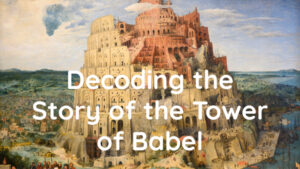By Cathy Eck
For Part I of the Shawshank Redemption posts, click here.
Innocence
Andy is sent to prison for murdering his wife and her lover, but he’s truly innocent. His innocence becomes a joke when Red tells him, “Everyone’s innocent in Shawshank.”
Shawshank prison is a metaphor for the false self — the illusion. We are innocent when we enter the illusion; then we’re tossed in a polluted sea of beliefs and rules perpetuated by people who committed one significant crime — they’re living as if they killed their own True Self. You can’t kill your True Self, but you can ignore it so well that it appears dead. You do that by following the authority figures in the illusion. You make them your false Gods.
Once we embrace the illusory way of thinking, we murder everyone, even if we never pull a trigger. We do to others what was done to us. We spiritually and emotionally murder them. We don’t want to admit it — everyone in Shawshank is innocent. So we reformat our mind focusing only on what we do or achieve; we ignore what we think. We suppress and hide our fears, our judgments, and our beliefs behind our good persona. We all look so innocent.
Warden Norton is a perfect metaphor for Andy’s false God. The job of authority is to make sure the prisoners don’t escape the illusion. Authority creates endless rules and punishments (pretending they’re God’s ideas). Freedom isn’t achievable. Uniqueness is labeled as nonconformity, insubordination, or stupid risk taking. If we accept the labels of authority, we get stuck in their world. Andy is insubordinate, in the Warden’s eyes, but he doesn’t let the Warden have his mind. He doesn’t try to manage the effects of his situation or keep score. Andy stays focused; he just keeps carting his wall out to the yard everyday.
The guards of the illusion play a role; their job comes wrapped with authority. We’re supposed to respect authority, but why? They didn’t earn it; they just bought some false knowledge or acquired a false title. They’re imposters. The power of authority is nothing more than beliefs that we’re forced to accept. We see that at first. But over time, we start to believe that authority does have power and that beliefs are more powerful than the truth. Red calls that becoming institutionalized.
Red: These walls are funny. First you hate ’em, then you get used to ’em. Enough time passes, you get so you depend on them. That’s institutionalized.
Red: Goddamn right. They send you here for life, and that’s exactly what they take. The part that counts, anyway.
Red: Forty years I been asking permission to piss. I can’t squeeze a drop without say-so.
Good Isn’t God
As you watch the Shawshank Redemption, something strange happens within your mind. The prisoners suddenly look good (they remind us of ourselves), and the lying Bible-thumping Warden is exposed as evil. Andy explains this to Red in a private conversation about how he’s cooking the Warden’s books.
Andy: If they ever try to trace any of those accounts, they’re gonna end up chasing a figment of my imagination.
Red: Well, I’ll be damned. Did I say you were good? Shit, you’re a Rembrandt!
Andy: Yeah. The funny thing is – on the outside, I was an honest man, straight as an arrow. I had to come to prison to be a crook.
It hard to distinguish good from evil in the illusion. People can fake a smile, perform good deeds, or quote the right parts of the Bible to support their good facade. Discrimination isn’t possible if our false self is too strong; our shared beliefs blind us. But if we let go of the illusory beliefs, chip away at our false mind just as Andy did to his wall, we find that our clear sight returns. We see the way out.
Who’s Your Warden?
Eventually Andy gets a chance at freedom. But the warden isn’t about to let his cover guy go. When the Warden denies Andy’s request for an appeal, Andy finally lets his anger out. He takes back his power.
Andy: It’s my life. Don’t you understand? IT’S MY LIFE!
The people who keep us stuck in the illusion aren’t our friends. They’re our prison guards. Prison guards want us to stay in prison with them. They don’t love us. If you love someone, you give them their freedom. The prison guards fear that if you escape, you’ll blow their cover. So they fill you with fear and guilt. But the truth really does set everyone free.
You either get busy living, or you get busy dying.
Andy chose to get busy living. He breaks free. Red gets his parole. And even the Warden gets freedom in the only way he can — he commits suicide. The religious fundamentalists see freedom as death since Heaven doesn’t exist on earth. Their beliefs assure their death although they do their best to project their beliefs in death on nonbelievers at the rapture.
So many people love this movie because each person gets exactly what they deserve, not based on actions or titles, but based on the extent to which each person’s mind has been liberated. One person breaking free creates a ripple effect that makes everything right. It’s exactly as it should be. True justice handles all the details.
Andy Never Forgot his True Self
Andy: That’s the beauty of music. They can’t get that from you… Haven’t you ever felt that way about music?
Red: I played a mean harmonica as a younger man. Lost interest in it though. Didn’t make much sense in here.
Andy: Here’s where it makes the most sense. You need it so you don’t forget.
Red: Forget?
Andy: Forget that… there are places in this world that aren’t made out of stone. That there’s something inside… that they can’t get to, that they can’t touch. That’s yours.
To be continued…

